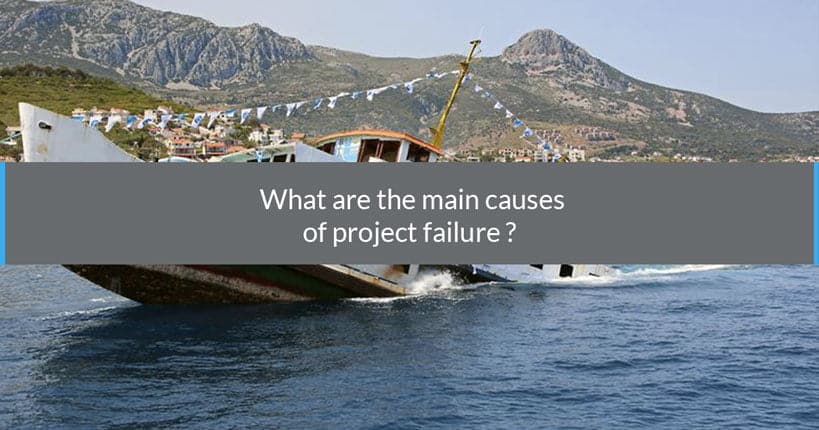“It’s hard to fail, but it’s worse to never have tried to succeed.” Franklin D. Roosevelt
Managing a project from A to Z is often a real challenge that requires a lot of work, rigor, and involvement. It’s a worthwhile investment when the project ends in success, however, despite the team’s best efforts, many projects can fail every year. According to 4PM, most companies see 70% of their projects fail. This is a source of significant financial loss for companies, as well as demotivates employees.
For a project to be considered a success, the project team must have produced the planned deliverables on time and within budget. According to a PwC study conducted in 2014, only 2.5% of companies succeed in all of their projects.
Discover the 7 main reasons that can lead to project failure:
1. Unclear or shifting goals
Each project must meet a specific objective and if this objective isn’t clearly defined or changes along the way, the team will have difficulty achieving it. For example, if a ship does not know its destination, it risks getting lost at sea and using all of its resources just to stay afloat.
So, start by establishing precisely what the objective of your project is by using the SMART method (Specific, Measurable, Acceptable, Realistic and Time-bound). The team will then know in which direction to go and will be able to do everything to achieve the goal set on time. Your employees will also be more motivated and more involved in the project by knowing where they are going.
2. A communication problem
Lack of communication is a recurring problem when it comes to project failure. If team members do not communicate with each other, how do you know who is doing what or who needs help to complete their task on time?
Communication and information sharing are essential elements in the success of a project. In addition, working together facilitates teamwork and develops creativity, building strong links and developing trust between employees. In the end, your team works in a good atmosphere and becomes more productive. What a bonus!
3. A lack of planning
Without basic planning, you run the risk of seeing your project fall behind schedule. In addition to missing the deadline, you will experience budget overruns, and if your project doesn’t reach the market on time, the business can miss opportunities, lose customers, and see sales decline.
It is not necessary to plan your project in great detail, it can actually be counterproductive, but it is essential to define the key dates for when each stage of the project should be completed. Systematically provide room for flexibility in the event of unforeseen events, it is better to plan longer and finish early than the other way around.
4. Lack of risk management
In project management, zero risk does not exist, and few projects go smoothly. Bankruptcy of a supplier, shortage of raw materials, resignation of a team member, various breakdowns, etc., if you have not thought about a solution upstream, such a situation can quickly turn into disaster and precipitate the project towards failure.
Hence the need to be prepared to face any problems that may arise during the course of the project. For this, it is essential to set up risk management from the start of the project. Identify all the potential risks to better prevent, limit or even eliminate them by considering the preventive and corrective actions that can be implemented if they arise.
5. A lack of follow-up
The project manager must follow the completion of his project and the execution of the tasks closely in order to make sure that everything takes place in the best possible conditions. If a problem arises, they are therefore able to intervene immediately. The success of the project depends on it, as does their reputation and career.
It is therefore essential to check that:
- The project is progressing towards the final objective.
- All intermediate objectives have been achieved.
- No task is delayed.
- The budget and deadlines are respected.
- Resources are used correctly and efficiently.
Do not hesitate to use the various monitoring tools that exist and update them daily.
6. Too many or unsuitable tools
There are a wide variety of tools to help you manage a project effectively, however, some tools are not flexible enough or are too complex, and instead of helping you, they slow you down. As a result, you waste time and money on software that you don’t or little use.
Project management software such as Wimi is the ideal tool. It allows you to easily follow the progress of the project, promote collaboration between team members, centralize all your documents, and much more. Best of all, you can try it out for free to see if it’s right for yo
7. Context and timing issues
If everything went well during the course of your project, it sometimes may be due to the context in which the project is complete that is the main cause of failure. A project can fail because now is just not the right time. For example, this was the case of the Renault Vel Satis (2002), a car with an overly modern design that did not appeal to customers, or even the Google Glass (2013), its high-tech glasses that were to transform the way we use technology.
A product that is too innovative, a competitor with a head start, or a sudden crisis in the target market, and your project may fall apart.
Conclusion
“Failures serve as repetitions of successes.” Cathy Reed, Japanese figure skater.
You now know the main causes of project failure and now you know what to do to make your project a success.
Has your project failed? Identify the causes of this failure and learn from your mistakes to prevent them from happening again.









